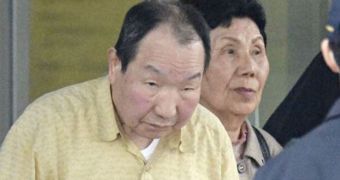A Japanese prisoner who has spent more than four decades on death row was freed after the court ordered a retrial in his case amid doubts about the evidence used against him.
Former professional boxer Iwao Hakamada was freed after DNA tests proved blood-stained clothing used in his prosecution did not actually belong to him. It is believed that police investigators fabricated the evidence to incriminate him.
Hakamada was accused in 1966 of killing four people – his boss, his boss' wife and their two children – in Shizuoka prefecture, central Japan. He was found guilty and sentenced to hang in 1968.
The 78-year-old man, who was also accused of burglary and burning down his boss' house, is believed to be the longest-serving inmate on death row of all time.
Hakamada admitted to the killing after 20 days of interrogation by police. However, he retracted the confession during the trial and revealed that police officers had beaten and threatened him in order to obtain his admission of guilt. He insisted he was innocent throughout his two-year trial.
The Guardian informs that the presiding judge Hiroaki Murayama has now suspended the death sentence and ordered a retrial for the former boxer.
“It is unbearably unjust to prolong detention of the defendant any further. The possibility of his innocence has become clear to a respectable degree,” judge Murayama said.
After 48 years behind bars, Hakamada was released from jail on Thursday. He walked out of the Tokyo Detention Centre accompanied by his sister Hideko Hakamada, who thanked her brother's supporters who were waiting in front of the court.
Unfortunately, the man's mental health has deteriorated seriously during the years spent in isolation, and it is believed that he now suffers from dementia.
Amnesty International is now urging prosecutors to accept the court's decision, arguing that Japanese authorities “should be ashamed of the barbaric treatment Hakamada has received.” Prosecutors have four days to appeal the ruling of the court.
“For more than 45 years, Mr Hakamada has lived under the fear of execution, never knowing from one day to the next if he is going to be put to death. This adds psychological torture to an already cruel and inhumane punishment,” Roseann Rife, East Asia Research Director at Amnesty International, said.
The use of forced confessions in Japan is still widespread, and capital punishment has overwhelming support among ordinary residents of the country.
Japanese judges are known to rarely order retrials for convicts sentenced to death, and Hakamada is only the sixth death row inmate in Japan to be retried.

 14 DAY TRIAL //
14 DAY TRIAL //